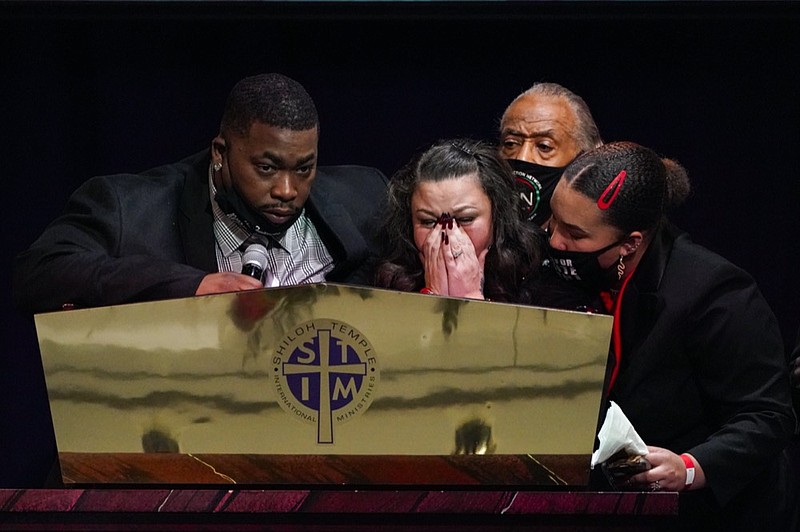MINNEAPOLIS (AP) - Daunte Wright, the young Black man shot by police during a traffic stop in suburban Minneapolis, was remembered Thursday at an emotional funeral just two days after a former police officer was convicted in the death of George Floyd and amid a national reckoning on racism and policing.
Hundreds of mourners wearing COVID-19 masks packed into Shiloh Temple International Ministries to remember Wright, a 20-year-old father of one who was shot by a police officer on April 11 in the small city of Brooklyn Center.
"The roles should be completely reversed. My son should be burying me," Daunte's mom, Katie Wright, said before burying her hands in her face in her hands.
Daunte's father, Aubrey, briefly took the microphone. When he passed it back, Katie Wright recalled her son becoming a father to a boy born prematurely: "He was so happy and so proud, and he said he couldn't wait to make his son proud. Junior was the joy of his life. He lived for him every single day."
Earlier, Ben Crump, attorney for both the Floyd and Wright families, asked attendees to stand and repeat the proclamation, "Daunte Wright's life mattered." Many raised their fists.
Crump has called for more serious charges against Kim Potter, the white officer who is charged with manslaughter in Wright's death. Potter's chief said he believed the officer, who has since resigned, meant to pull her Taser. But Potter should not have pulled any weapon, Crump said.
"At some point Daunte Jr. is going to get old enough to watch that video of how his father was slain so unnecessarily. A misdemeanor, a misdemeanor," Crump said. "It's too often the traffic stops end up as deadly sentences, a death sentence. We're going to have to make sure that Daunte Jr. know that we stood up for Daunte, his father."
As the service began, soloist Jovonta Patton and the Shiloh Temple Mass Choir brought the service to a rousing high, singing, "Before I'd be a slave, I'd be buried in my grave, and go home to my Lord and be free." The lyrics are from a post-Civil War, Black freedom song titled, "Oh, Freedom!"
During a silent reading afterward of Wright's obituary, some attendees could be heard crying softly.
And in performances that brought attendees to their feet, artist Ange Hillz painted a portrait of Wright - white paint on a black canvas - as trumpeter Keyon Harrold played "Amazing Grace" and "Lift Ev'ry Voice and Sing," the Black national anthem. Hillz executed similar portraits of Floyd, at his funeral, and of Breonna Taylor, a Black emergency medical worker who was shot five times by white Louisville, Kentucky, officers in March 2020 as they served a warrant.
The Rev. Al Sharpton, the civil rights leader, was to deliver the eulogy, and told The Associated Press that he would first pay tribute to Wright, "a young man just at the beginning of life, full of life."
He said he would also use his remarks to remind those in attendance or watching from afar that the fight for justice didn't end when white former Minneapolis police Officer Derek Chauvin was found guilty of murder and manslaughter for holding a knee to Floyd's neck, choking off his breathing until he went limp last May.
"We should not think that, because we won one battle with Chauvin, the war is over, or that if we do not get justice for this case, that we will undo what we were able to do with George Floyd," Sharpton said.
The families of several other Black people killed by police attended Wright's funeral, including the mothers of Philando Castile, who died after being shot by a police officer during a traffic stop in a Minneapolis suburb in 2016, and Eric Garner, who was filmed saying "I can't breathe" in a fatal 2014 encounter with New York City police.
Also attending were the families of Oscar Grant, a Black man killed in 2009 by a California transit officer who mistook his service weapon for a stun gun, similar to the Wright case, and of Emmett Till, the teenager whose 1955 lynching in Mississippi helped spark the Civil Rights Movement.
U.S. Sen. Amy Klobuchar, Gov. Tim Walz and Minneapolis Mayor Jacob Frey also attended.
More than a dozen members from an armed team of local men, the Minnesota Freedom Fighters, provided security.
Wright's killing set off protests in Brooklyn Center, a working-class, majority nonwhite city, with hundreds of people gathering every night for a week outside the city's heavily guarded police station. While the mayor called for law enforcement and protesters to scale back their tactics, the nights often ended with demonstrators lobbing water bottles and rocks at the officers, and law enforcement responding with pepper spray, tear gas and rubber bullets.
The police chief said it appeared from body camera video that the officer who shot Wright used her pistol when she meant to use her Taser. The white officer, 26-year veteran Kim Potter, is charged with second-degree manslaughter. Both she and the chief resigned soon after the shooting.
Wright was pulled over on a Sunday afternoon. His mother said he called her to say he was stopped for having air fresheners hanging from his rear-view mirror - a traffic violation in Minnesota. Police said he was stopped for having an expired car registration.
The shooting occurred when a scuffle broke out as police tried to arrest Wright, after realizing he had an outstanding warrant for failing to appear in court on charges of fleeing police and having a gun without a permit.
___
Webber reported from Fenton, Michigan. Morrison is a member of the AP's Race and Ethnicity team.
